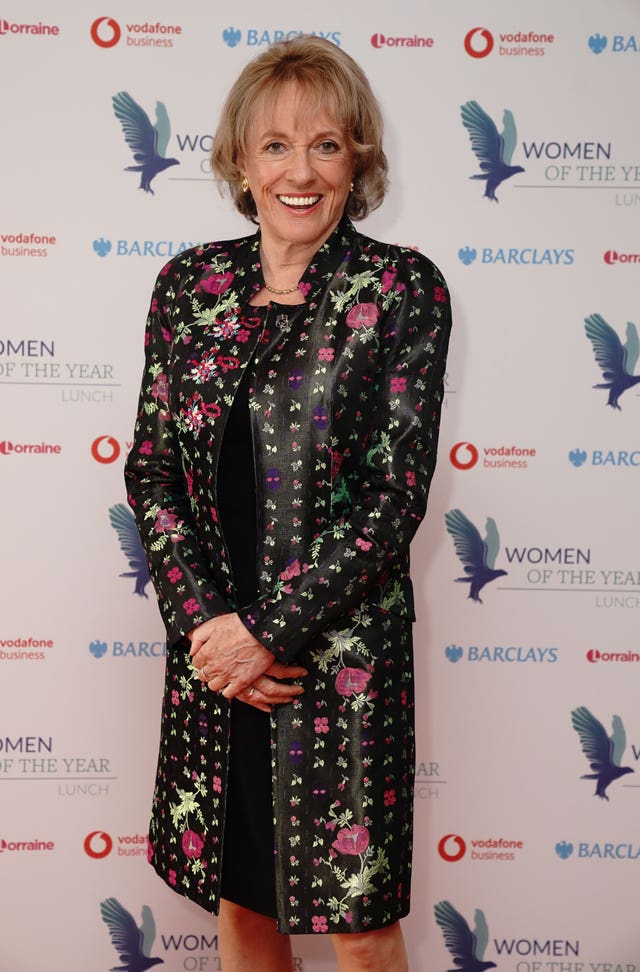Dame Esther Rantzen will make her own decision on Dignitas, says daughter
The broadcaster has stage four lung cancer and has joined the Swiss assisted dying clinic.

The daughter of Dame Esther Rantzen has said she “would want to ground her plane if she was going to fly to Zurich” but knows it would be her mother’s choice after the 83-year-old revealed she has joined the Dignitas assisted dying clinic.
The Childline founder and broadcaster revealed in May that her cancer has progressed to stage four.
In an interview with BBC’s The Today Podcast on Monday, she called for a free vote on assisted dying and said she is considering the option if her lung cancer treatment does not improve her condition.
Her daughter Rebecca Wilcox told ITV’s Good Morning Britain that she knows it would be her mother’s decision but she would not want her to go.
Asked if it was a family decision, Ms Wilcox said: “I think you have met my mother and I think you would know that she never makes a decision in complete isolation but she doesn’t care what anyone else thinks.”
Addressing how they are feeling as a family, she added: “It’s horrific and she always promised us she would live forever and she’s not usually one to break her promises, so we’re a little bit upset about that.
“But the joy of having this Christmas – it feels like a Christmas miracle and I hate saying that because it’s so saccharin and that is not what my family’s about – but when we got the diagnosis in January, we never thought we would have this Christmas again.”
She added: “It’s a joy and a delight and I personally would want to ground her plane if she was going to fly to Zurich but I know it’s her decision. I just don’t ever want her to go.”
On whether her mother has made the right decision, Ms Wilcox said: “Absolutely. We’re allowed to make decisions about everything in our own lives. We’re allowed to make this decision and I know this is constantly said about our pets, so I have a very elderly horse who will have to be put down if something happens to him and I would be considered inhumane if I didn’t do that.
“And yet, if mum is experiencing such dreadful symptoms and there is no hope, then why shouldn’t she be able to make that decision?”

She continued: “She said to me, ‘We have medicines and drugs that help prolong life – why are we allowed to use those and not allowed to use the ones that make you have a dignified death?’ That’s what Dignitas is. It’s a dignified death and it is your own choice.”
Assisted suicide is banned in England, Wales and Northern Ireland, with a maximum prison sentence of 14 years.
The Health and Social Care Committee is due to publish its report into assisted dying and assisted suicide in England and Wales, having launched an inquiry in December 2022 to examine different perspectives in the debate.
Dame Esther has called for a free vote on the issue, as her family could be prosecuted if they were to travel with her to a Dignitas clinic.
Ms Wilcox said: “We have midwives for birth, we don’t have a midwife for death. Why can’t she make her own decisions? She has never been one to listen in a vacuum to other people.
“It’s really hard to talk about because I don’t want her to die but I want her to have the choice and what she says about UK law is that we’re constantly making these rulings on the worst-case scenario.
“There are various people out there who would take advantage of relatives for a will or whatever it may be, but they are the few and the many are those who want the choice to have a dignified, painless death that is actually a positive experience. We should talk about death as if it could be a positive experience.”
Asked if she would go with her mother when the time comes, she replied: “Legally I can’t say that because I’d get in trouble but I hear Switzerland is very nice.”
Dame Esther became a household name at the BBC and is perhaps best known for presenting That’s Life! – a programme featuring a mix of investigations, topical issues and entertainment – from 1973 to 1994.
In addition to her success as a journalist and broadcaster, she set up children’s charity Childline in 1986.
In 2006, the charity – which offers counselling and support for children and young people in the UK up until the age of 19 – became part of the The National Society for the Prevention of Cruelty to Children (NSPCC).





